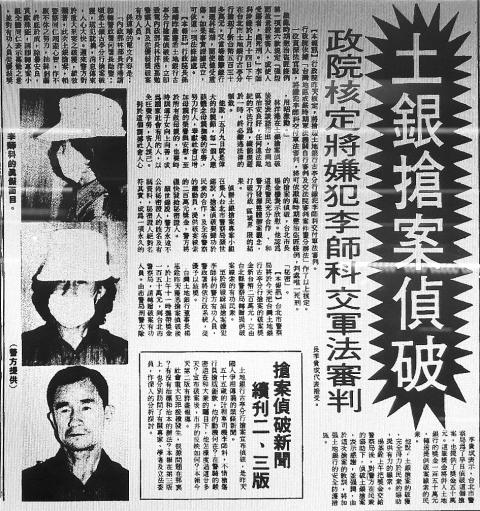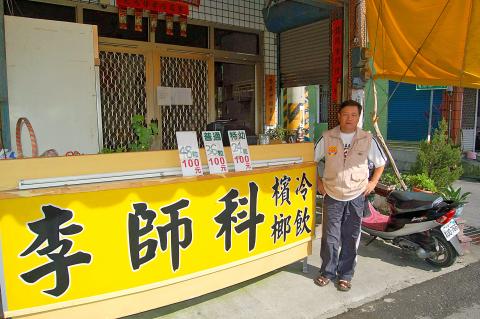April 10 to April 16
A golden statue of Lee Shih-ke (李師科), looking harmless with his hands on his hips, stands watch as a “door god” under a corrugated metal roof outside a small shrine in the mountains of New Taipei City’s Sindian District (新店).
Taiwan is full of figures whose reputations have drastically reversed over time — but it is still quite incredulous that the country’s first gunpoint bank robber, who also admitted to murder, is still worshipped as a “righteous bandit” to this day.

Photo: Han cheung, Taipei Times
THE HEIST
On April 14, 1982, the 55-year-old military veteran entered the state-owned Land Bank of Taiwan’s Guting branch in Taipei and brandished the .38 revolver he had obtained two years earlier by murdering a special police officer. Lee was wearing a wig, baseball cap and a sanitary mask.
He reportedly yelled, “This money belongs to the country, but your life belongs to you,” and demanded NT$10 million (about US$326,000 at the current exchange rate). He ended up shooting and injuring the assistant branch manager, who did not heed his warnings to back off, and made off with about NT$5.3 million.

Photo: Lee Li-fa, Taipei Times
The heist was plastered all over the front pages of the newspapers, as it was something unheard of in those times. It was partially recorded by security cameras and shown on television.
“If the television news did not state that this happened in Taipei, we could have mistaken it for a commercial for an American Western film,” the United Daily News printed. “We would never imagine that this was a real person with a real gun ...”
Before Lee was caught less than a month later, the police first apprehended Wang Ying-hsien (王迎先). They forced a confession out of him, but Wang allegedly committed suicide by jumping into a river while feigning to lead the police to the weapon and cash.

Photo courtesy of Wikimedia Commons
A few hours after Wang’s death, Lee was caught. He confessed to the crime right away as well as admitting to killing the police officer two years earlier. He explained in detail his motives and how he pulled the heist off to reporters, stating that he had visited the bank several times and had already planned out his escape route. He stored NT$4 million at a friend’s house, while keeping the rest in his apartment.
Lee told United Daily News reporters that he robbed the bank because he was unhappy with the way society was developing. He detested the “noveau riche” and financial criminals and wanted to make a statement.
However, when pressed further about why he needed so much money, he replied, “To provide for myself in old age. It costs money to womanize, it costs money to gamble, it costs money to buy things!”
While he initially claimed that he only spent NT$50,000 of his loot, later reports state that he spent about NT$140,000. Lee admitted that he spent most of it on women as well as purchasing a gold bracelet and a watch.
The reporters further questioned why Lee, who was a taxi driver with no family in Taiwan, had no savings. He replied that he spent all his money on “women and dice.”
Not a very sympathetic figure so far — but this next statement, in addition to his anger towards the unequal distribution of wealth — is probably why some saw him as a sort of modern-day Robin Hood. The reporters then asked Lee why he stored the bulk of the money at his friend’s house.
He replied, “He has a daughter in elementary school. I figured that I would be caught anyway, so I decided to leave the money with him so the daughter can go to college.”
Since Taiwan was still under martial law, Lee received a swift military trial. He was executed several weeks later.
LASTING EFFECTS
Lee’s statue at the shrine was originally accompanied by one of Liao Tien-ting (廖添丁), the legendary robber-turned-deity who was active during the early Japanese colonial era and is often described as Taiwan’s Robin Hood. Ironically, Liao’s statue collapsed during a typhoon, and Lee’s remains standing today.
Liao was also a murderer, but history often pardons him because his victim was an alleged informant for the Japanese government. It’s unclear how true the stories about Liao are, but it is clear that Lee’s victim only died so Lee could obtain his gun.
Aside from being worshipped, Lee’s robbery was also portrayed in several movies and television series. But one concrete effect is that until this day, almost all banks in Taiwan require patrons to remove their surgical masks and motorcycle helmets before entering. Many have warning signs.
Wang’s tragic death also had ramifications, as he was reportedly denied legal counsel and tortured by the police until he confessed. The result was an amendment to Article 27 of the Code of Criminal Procedure (刑事訴訟法), which guarantees a suspect the right to appoint a defense attorney.
Another curious aftermath is the tale of Lee Ching-ke (李清科), who was so sick of people asking if he was related to the bank robber that he decided to rename his betel nut shop “Lee Shih-ke.” Unexpectedly, people started flocking to the store just because of the name, and business boomed. Lee Ching-ke decided to use a portion of the profits to help the poor — perhaps he is the real modern-day Robin Hood.
Taiwan in Time, a column about Taiwan’s history that is published every Sunday, spotlights important or interesting events around the nation that have anniversaries this week.

May 18 to May 24 Pastor Yang Hsu’s (楊煦) congregation was shocked upon seeing the land he chose to build his orphanage. It was surrounded by mountains on three sides, and the only way to access it was to cross a river by foot. The soil was poor due to runoff, and large rocks strewn across the plot prevented much from growing. In addition, there was no running water or electricity. But it was all Yang could afford. He and his Indigenous Atayal wife Lin Feng-ying (林鳳英) had already been caring for 24 orphans in their home, and they were in

On May 2, Chinese Nationalist Party (KMT) Chairman Eric Chu (朱立倫), at a meeting in support of Taipei city councilors at party headquarters, compared President William Lai (賴清德) to Hitler. Chu claimed that unlike any other democracy worldwide in history, no other leader was rooting out opposing parties like Lai and the Democratic Progressive Party (DPP). That his statements are wildly inaccurate was not the point. It was a rallying cry, not a history lesson. This was intentional to provoke the international diplomatic community into a response, which was promptly provided. Both the German and Israeli offices issued statements on Facebook

Even by the standards of Ukraine’s International Legion, which comprises volunteers from over 55 countries, Han has an unusual backstory. Born in Taichung, he grew up in Costa Rica — then one of Taiwan’s diplomatic allies — where a relative worked for the embassy. After attending an American international high school in San Jose, Costa Rica’s capital, Han — who prefers to use only his given name for OPSEC (operations security) reasons — moved to the US in his teens. He attended Penn State University before returning to Taiwan to work in the semiconductor industry in Kaohsiung, where he

Australia’s ABC last week published a piece on the recall campaign. The article emphasized the divisions in Taiwanese society and blamed the recall for worsening them. It quotes a supporter of the Taiwan People’s Party (TPP) as saying “I’m 43 years old, born and raised here, and I’ve never seen the country this divided in my entire life.” Apparently, as an adult, she slept through the post-election violence in 2000 and 2004 by the Chinese Nationalist Party (KMT), the veiled coup threats by the military when Chen Shui-bian (陳水扁) became president, the 2006 Red Shirt protests against him ginned up by